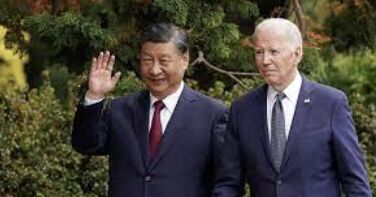China Extends Olive Branch to Broadcom and Mastercard, Amidst Growing Concerns for U.S. Companies
This news article discusses the recent approvals received by Broadcom and Mastercard from China, suggesting them as potential signs of appeasement amid growing concerns about doing business in the country. However, it emphasizes the challenges and complexities that foreign companies still face in the Chinese market.
In recent news, two major U.S. companies, Broadcom and Mastercard, have received approvals from China for their business deals, leading some to perceive them as olive branches extended amid growing concerns about doing business in China. These approvals are seen as isolated successes and must be viewed within the broader context of the bilateral relationship between the U.S. and China. Starting with Broadcom, the chipmaker's CEO, Hock Tan, paid $40,000 to join Chinese leader Xi Jinping's dinner in San Francisco. This move is significant considering Broadcom's $69 billion deal with VMware, which was awaiting China's approval.
The deal had been delayed for months, with Chinese regulators scrutinizing the bid. However, shortly after the dinner, China signed off on Broadcom's acquisition. The timing of this approval suggests a connection to the CEO's participation in the dinner. Mastercard also received approval from China to issue yuan-denominated cards, something it had been seeking for years. These approvals for Broadcom and Mastercard are viewed as conciliatory gestures towards American corporations as concerns about doing business in China continue to grow.
The approvals highlight how companies can become entangled in the escalating geopolitical competition between the U.S. and China. Although these approvals are seen as positive developments, they are unlikely to open the floodgates for investment in China. Many business executives caution that there are still significant challenges for foreign companies operating in China, including opaque data localization laws, limited access to information, and increased scrutiny from both Chinese and U.S. officials. These factors contribute to a cautious approach from multinational corporations towards investing in China.
Furthermore, a recent survey by the Conference Board indicates declining confidence among CEOs of multinational companies operating in China. The survey shows a drop in CEO confidence, with many anticipating a decrease in capital investments and a reduction in headcount. Overseas firms have also been withdrawing significant earnings from China, demonstrating a decline in the country's appeal for foreign capital.
Overall, while the approvals for Broadcom and Mastercard may signify positive developments, they should be viewed as isolated cases within a complex and challenging business environment in China. The geopolitical tensions, regulatory changes, and economic nationalism in China present significant obstacles for foreign businesses operating in the country. Despite recent approvals, much work remains to be done to reassure multinational corporations of their welcome in China.




